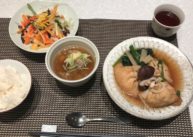
餅入り稲荷寿司
The hardest dish, but the most delicious one!
For my CIP, I attended cooking lessons at La Carriere cooking school. My time there was like a condensed version of my time in Japan as a whole. Every moment I spent at that school was a mix of confusion and excitement, and I was basically always hungry. The lessons consisted of a forty minute lecture in the preparation of the dishes and then an hour and a half of cooking. The lectures were extremely difficult to understand and so I gained only a cursory knowledge of culinary terms. Still, the lecturers prepared the dish as they talked, so I was able to glean the technique just by looking. If I got distracted for even a moment I would fall behind the other students and not be able to complete the dish, so this class really tested my focus. In general, this need to focus was pretty reflective of my experience in Japan: the only way I can avoid making a fool of myself and getting lost is if I carefully observed how others behave.
The other students, all much older than me, were a mixed bag. I definitely did not put as much effort as I should have towards trying to use keigo with my cooking partners; still, it was already enough of a challenge to complete the dish and speak in the desu/masu form I was used to, so keigo seemed impossible. On the other hand, I was surprised how easy humor transferred over sometimes. I’ve been told that jokes do not really translate, but if I said smiled and said「作りにくいですね 」when my partner and I were both struggling, I could get a genuine laugh.
I was grateful for this, as I communicate mostly through humor in English, and I was worried my classmates would be too serious or stuck up to be kind to a young foreigner like me. Sometimes my partners would not reciprocate, but they would at least feign interest. In general, the elderly people I talked to were exceptionally skilled at pretending to care and at politely declining things; frankly, they were so well mannered it was shocking. They had social skills that were pretty lacking in America.
I was even able to meet a retired doctor who took me to a Soto Zen sitting at a temple in a small town, which has been a dream of mine for a long while. At the temple, everyone was exceptionally open. It was interesting to see how much more relaxed they were during the sitting sessions than the Americans I had meditated with in Boston. People in Japan have been practicing Zen for so long that there is no need to put on a show or to pretend to be something they are not. The monk lectured for a long time, but he did not feel the need to prove himself, which was refreshing compared to the way all the American Zen teachers try to show off their intellectuality.
In general, these two experiences were extremely gratifying and made all the trouble of learning Japanese—including all of the embarrassing moments—worth it: I got a genuine glimpse of two subcultures within Japan, and now I understand a bit more about the people who populate them.

Trying to cook following 40-minute long Japanese instructions seems really hard! Did you ever end up making a mistake with ingredients or anything because of that? I can’t even cook in English so props to you.